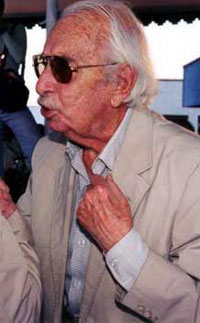|

Edmundo O'Gorman (1906-1995)
(Academia Mexicana de la Historia) |
O'Gorman, Edmundo (1906-1995), historian,
was born on 24 November 1906 in the city of Mexico, the
second son of the Dublin-trained mining engineer and painter
Cecil Crawford O'Gorman (1874-1943), who arrived in Mexico from
Ireland in 1895, and his wife and cousin Encarnación O'Gorman,
née O'Gorman. Cecil O'Gorman was the son of John
O'Gorman, educated at
Eton in
England, and grandson of Charles O'Gorman, who in August 1823
was appointed the first British consul to Mexico. Other children
of Cecil and Encarnación O'Gorman were the artist Juan O'Gorman
(1905-1982), Margarita O'Gorman and Tomás O'Gorman, a notary
public.
Edmundo O'Gorman attended the University of Mexico Law
School, where he graduated in 1928, but then decided to research
and teach history. In 1948 he obtained his doctorate in
philosophy and in 1951 in history. In 1932-1952 he worked at the
Mexican public records office, and contributed to the Boletín
del Archivo General de la Nación. O'Gorman was appointed a
member of the Mexican academies of literature in 1969 and of
history in 1972.
An agitated historical debate developed in 1985 between
Miguel León Portilla, who published 'Encuentro de dos mundos' in
Cuadernos Americanos 2 (1987, pp. 188-191), and Edmundo
O'Gorman, who replied with 'Encuentro de dos mundos o lo
superfluo' in the same journal (pp. 192-213). O'Gorman was
against the use of concepts such as 'discovery of
America',
'encounter of two worlds', and 'natural mixing' and, as a
result, he resigned from the academy of history.
For his outstanding research, Edmundo O'Gorman was awarded
the Mexican National Literature Award (1964), the Rafael
Heliodoro Valle History Award (1983), the Humanities Teaching
Award of the Universidad Autónoma (1986), and an honoris
causa doctorate from that university (1978).
Among Edmundo O'Gorman's works are Historia de las
divisiones territoriales de México (1937), Fundamentos de
la historia de América (1951), La supervivencia política
novohispana (1961), México: el trauma de su historia
(1977), La incógnita de la llamada 'Historia de los indios de
la Nueva España', atribuida a Fray Toribio Molinia (1982),
and Destierro de Sombras (1986). However, his most
popular book is El proceso de la invención de América
(1958), in which O'Gorman opposed the traditional concept of
discovery to an innovative reading of the primary sources
from original perspectives. He argued that in European culture,
the American continent was the result of an intellectual
creation. For his work with contemporary sources on
Columbus and
other conquistadors, Edmundo O'Gorman is often singled as one of
the pioneers of post-colonial studies in Latin America.
Edmundo O'Gorman married the art historian Ida Rodríguez
Prampolini (b. 1925) of
Veracruz.
He died on 28 September 1995 in Mexico City.
Edmundo Murray
References
-
Díaz Palafox, Guillermo. Edmundo O'Gorman. In memoriam
1906-1995. Polvo enamorado (TV documentary, 1996).
- Hernández López, Conrado. 'Lo inmediato: Diez años sin
Edmundo O'Gorman' in Imágenes: Boletín informativo
del Instituto de Investigaciones Estéticas
(Mexico), available online (http://www.esteticas.unam.mx/boletin_imagenes/inmediato/inm_conrado03.html),
accessed on 8 February 2007.
- Matute, Alvaro. 'El historiador Edmundo O'Gorman
(1906-1995) -- introducción a su obra y pensamiento histórico'
in Mexican Studies, Estudios Mexicanos, 13: 1 (winter
1997), pp. 1-20.
Archives
- Edmundo O'Gorman Collection (official documents and other
papers relating to the history of 16th-20th century Mexico),
Benson Latin American Collection, General Libraries, The
University of Texas at Austin (http://www.lib.utexas.edu/taro/utlac/00047/lac-00047.html). |


